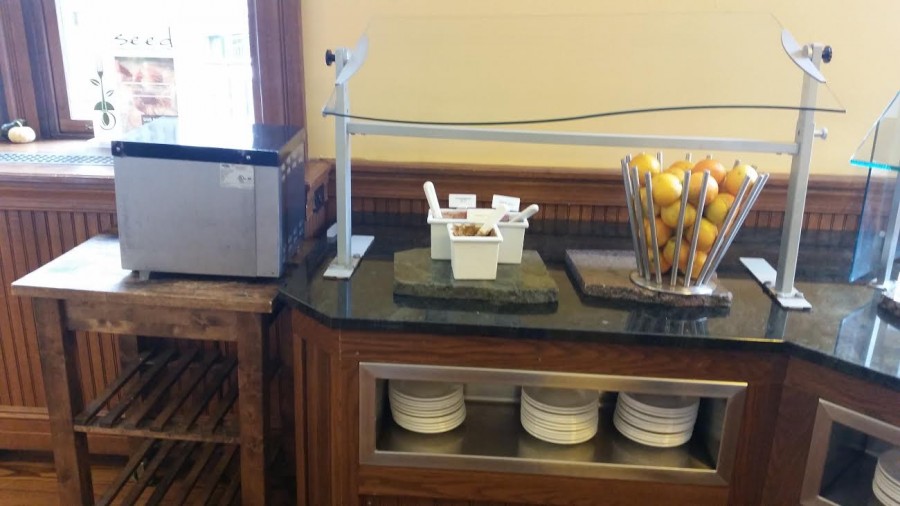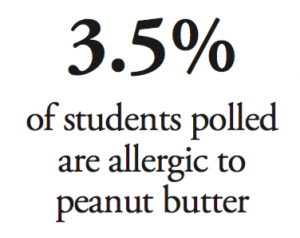Hackley Removes Peanut Butter from Dining Hall
Nut allergy concerns drive disappearance of lunch staple
Credit: Marc Rod
The once-popular PB&J station in the Dining Hall, which now holds sunbutter instead of peanut butter.
October 23, 2015
This school year many Hackley students and teachers have noticed (and bemoaned) the absence of peanut butter from the Dining Hall. Beginning this year the dining hall is no longer serving peanut butter, a preventative measure to ensure no peanut-related allergic reactions occur. According to the American Academy of Allergy Asthma and Immunology, 38.7% of food allergic children have had a history of severe reactions.
Peanut butter has always been a favorite among Hackley students. It was used for PB&J sandwiches as well as with granola, ice cream, and fruit. Sunbutter, a sunflower seedbased spread, is still offered as an alternative.
Administrators and Flik made a mutual decision to remove the peanut butter to ensure student safety. “On behalf of the Flik staff, we all support the decision to remove peanut butter from the lunch room because we want to create the safest environment possible for the Hackley community,” said Natalie Aguilar-Gonzalez, head of Flik services at Hackley.
“The possibility of cross-contamination means that even if we are quite confident the peanut butter will stay in its own special container, we cannot guarantee it. That uncertainty led us to lean towards a more reliable safeguard, that being the peanut-free option,” said Assistant Headmaster Philip Variano.
Many students who enjoyed the peanut butter are upset that it is no longer an option. “People with nut allergies know how to control their allergies and I think the whole community should not have to accommodate to something they should be able to handle on their own,” remarked sophomore Demetra Yancopolous, “it severely limits food options and isn’t fair to the majority of students.”
PB&J sandwiches were grilled in the panini maker, a danger to those with nut allergies. This continued to happen, even after disciplinary action was taken by administrators. These actions, as well as existing concerns about cross-contamination, threatened the safety of people with nut allergies and resulted in the removal of the peanut butter.
Community Council has discussed the topic at their weekly meetings. Council talked about possible ways to ensure PB&J sandwiches are not placed in the panini makers. Many council members pointed out it is difficult to monitor. Some said that if people broke the rules before, knowing how dangerous it was to others, what would stop them from continuing?
There was a lively debate in which some members argued that peanut butter should be brought back with stricter regulations. Others, such as senior Sabina Thomas, who has a nut allergy, raised some good points as to why it should not return to the dining hall.
“I love panini-ing sandwiches, and sometimes I would have to throw out my sandwich because the oils in the panini from a peanut butter sandwich seeped into my sandwich,” Sabina said. “To think that my health and the health of some of my classmates is at risk because our fellow classmates consciously decided not to follow rules is really upsetting. I’m glad peanut butter’s gone because our community as a whole needs to be accountable for consciously not following rules.”
Others at Hackley feel that their allergy should not stop oth- ers from enjoying the peanut butter. “It’s kind of sad because a lot of people really really like peanut butter, I am just allergic to it,” said sophomore Kioni Marshall. “For people with peanut butter allergies like myself, if I were to make a panini, I should watch out for that and make one at my own risk because I know that other people are there making paninis.”
Removing peanut butter from the dining hall provides a safer dining experience for those members of the Hackley community who have nut allergies, yet it also means there are fewer possible lunch options for others. Peanut butter is a versatile option and an important lunch staple, yet if not monitored or used according to the rules, it can be dangerous and even deadly.


